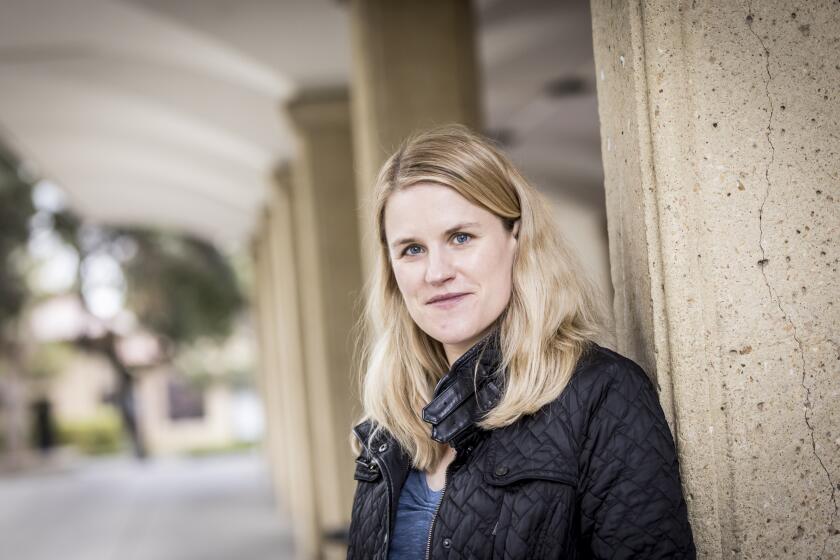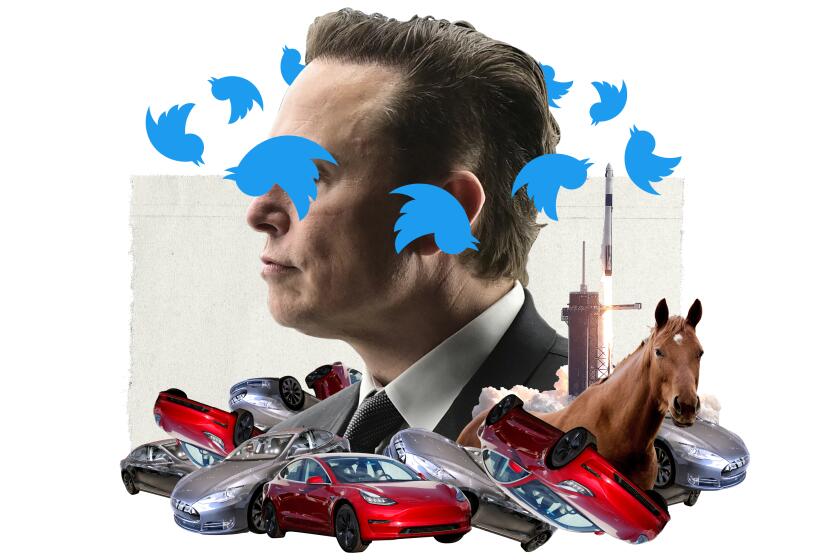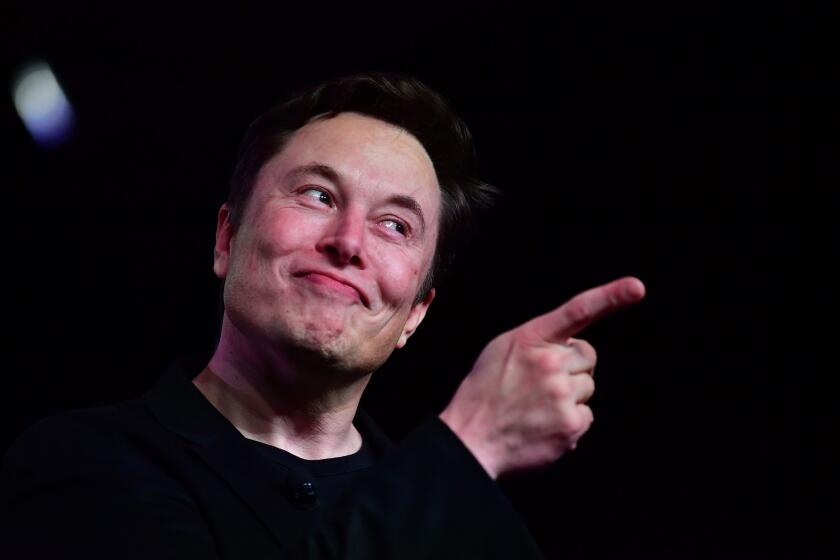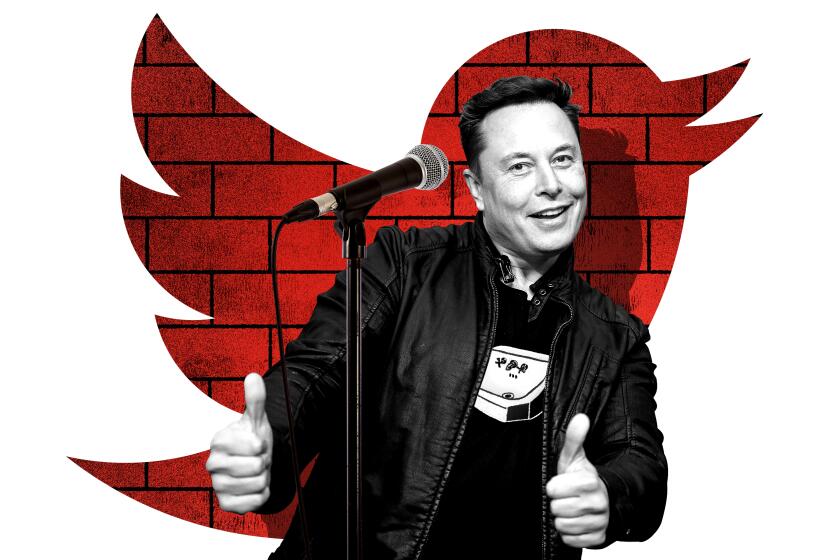Column: Elon Musk has replaced Twitter with X — and an actual business with science fiction
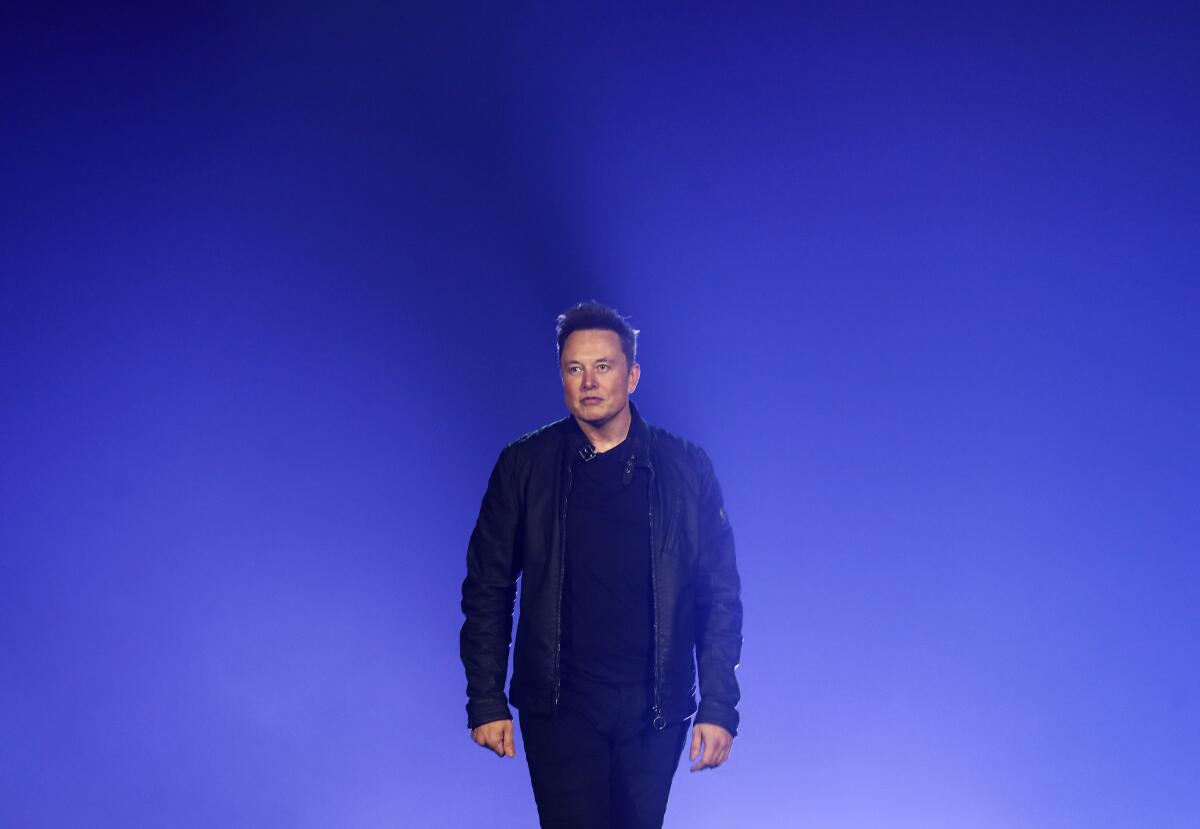
R.I.P. Twitter. Welcome to the world, uh, X.
We all know that the world’s richest man is impetuous and more than happy to court controversy. Even so, Elon Musk’s sudden move over the weekend to transform Twitter, the social media company he purchased for $44 billion last year, into an entity obliquely named after the 24th letter of the alphabet, struck even his admirers as bizarre and ill-conceived.
The Twitter name and bird logo are gone; a slapped-together X now stands in their place.
Bloomberg reported that the move may wipe out as much as $20 billion in brand value — almost half of what Musk paid for it. Observers noted that the X logo made it look more like a porn company than a social platform. A reporter for TechCrunch, a website famous for reflecting Silicon Valley optimism, wrote, simply, “It’s trash.”
The tech world spent the following days trying to read the tea leaves, to game out Musk’s plans and motives for overhauling — some would say desecrating — one of the most recognizable names in tech. Why would Musk do this now, with so little planning or warning? Why would he do it at all?
But any efforts at rational analysis are futile.
There’s a paradox at the heart of Facebook, Twitter, Reddit and other companies that rely on user-generated content — and it’s leading to their downfall.
This is, quite simply, the richest entrepreneur in world history doing what he wants, what his lizard brain tells him to do, when there is no one left in a position to advise him against doing it. And what Musk has wanted, for decades, is to call a company “X.”
In the late 1990s, Musk was chief executive of PayPal, a successful payment processing company, and he wanted to turn that into X too. The board, led by Peter Thiel, revolted, and ousted Musk. An idea that most everyone else at the company was embarrassed to be associated with was nipped in the bud. This time, there is no board of directors at Twitter, because Musk dissolved it, and Musk feels he no longer needs to answer to anyone.
The difference between these two epochs is pretty simple: money. So much money. And power, sure, but mostly money. The so-called PayPal mafia that would go on to dominate the tech world were then constrained by serving customers and the bottom line. Elon Musk and the Silicon Valley of today exist in another universe; a vague notion issued from a tech billionaire’s lips can transform a network used by hundreds of millions of people, overnight.
As a result, like so many of his fellow tech sector heavies, Musk — buffeted by unprecedented stores of capital, surrounded by yes men and a rapidly waning stock of good ideas — is becoming further untethered from the constraints of reality.
This was apparent immediately in the announcement of the new X enterprise.
Elon Musk’s track record as a boss is an endless scroll of impulse firings, retribution, tone-deafness on race — and the impregnation of a subordinate.
Former Twitter and current X CEO Linda Yaccarino heralded the venture in a series of what were formerly known as tweets — now, apparently they’re supposed to be called “xeets.”
(“Sheets”? “Zeets”? “Exeets”? Your guess is as good as mine. Anyway.)
“X is the future state of unlimited interactivity,” she wrote, “centered in audio, video, messaging, payments/banking — creating a global marketplace for ideas, goods, services, and opportunities. Powered by AI, X will connect us all in ways we’re just beginning to imagine.”
This can be interpreted as an insistence the company will be able to do almost everything, but ultimately means next to nothing. It’s not the language that’s novel — such impenetrable buzzspeak has been the currency of Silicon Valley for decades — but that it was instantly put into action, in service of a product that remains equally abstract. Twitter is now not merely a company but a “future state”!
Despite the highfalutin framing, the only part of X described above that is not already in some way a part of Twitter is a means of making payments. Fortunately, in a recent interview, Musk himself elaborated on his vision for X’s foray into finance. Namely, it would be large. “Essentially if done right, X would serve people’s financial needs to such a degree that over time it would become half of the global financial system,” Musk said. “It would be by far the biggest financial institution.”
This is a fundamentally unserious thing to say, but Musk was serious. Half the global financial system, in this projection, would be conducted on an app that has 350 million users, and is constantly glitching out and running up against rate limits.
Musk has a reputation for making bold statements that rarely resolve into reality — remember the brain-computer interface he promised, or the artificially intelligent humanoid robot? Or that he’d be sending people to Mars soon? But even so, this one feels like a new frontier. It’s a tell, in part because it’s so lazy. It’s hard to know if Musk even believes the line himself, or if it just fell out of his mouth, a half-formed notion. But Twitter, a hallmark of 21st century communication, is being hastily remade in its shape anyway.
It’s tempting to write off Elon Musk’s bad business decisions, such as trying to charge Twitter users for blue checks. But his naked cash grab is part of a sea change we should all take seriously.
And it is nothing if not hasty. The move was so sudden that when the announcement was made, the link to X.com on Musk’s profile directed many users, myself included, to a Godaddy error page. Engineers and web developers scratched their heads — a modicum of planning could have avoided this kind of amateurish outcome. Meanwhile, it’s not even clear that Musk owns the trademark for X. It may even be owned by Meta, his chief competitor.
The physical rebrand didn’t fare much better: When construction workers brought a crane to Twitter HQ to tear down the old logo, city officials had to interrupt the work. Musk hadn’t filed for a permit, and the crane was blocking traffic — including, apparently, some autonomous cars. (You could do worse for a snapshot of our technological moment than the most famous entrepreneur of our age ordering a spur-of-the-moment name change on his social media company, and mucking up the works so much that a line of robotaxis were forced to wait to get by.)
In the past, launches of new companies announced by founders and the tech giants were highly produced, carefully stage-managed affairs. Now they’re rush jobs. Facebook’s misbegotten transformation into Meta wasn’t much better, though at least Zuckerberg didn’t torch his own social platform in the process — Facebook is called Facebook. When Google announced Bard, its new AI service, it made embarrassing, billion-dollar errors right out the gate.
There’s an increasing sense that Silicon Valley is scrambling to chase fads, dodge scrutiny and frantically grasp at a future it can no longer be bothered to properly articulate. In my last column, I argued the 2010s would be remembered as the era of the valley’s magical thinking, due largely to its insistence that endless scale would solve any problem.
The 2020s are shaping up to be Silicon Valley’s era of reactionary indulgence. Power has concentrated into a handful of players, who have more money to throw around than ever before, yet less of a coherent vision to throw it at. They wind up chasing short-term trends such as the metaverse, crypto or whatever X is, pouring capital and resources into grand but impossibly half-baked schemes.
Just last week, it was revealed that Sam Bankman-Fried, who ran a major crypto exchange and is now facing fraud charges, aimed to purchase the entire island nation of Nauru to build a network of survival bunkers. If the exchange hadn’t collapsed, he very well may have.
David Karpf, an associate professor of media and public affairs at George Washington University, has a research project in which he’s reading through every back issue of Wired magazine through the ‘90s. One thing he keeps noticing, he tells me, “is just how small the numbers were back then. It’s the same set of people, with the same mind-set and the same mistakes. But they’re covering million-dollar companies. Bill Gates is a titan as a single-digit billionaire. It all got magnified a hundredfold.”
“Musk with $2 billion can’t put himself into this situation,” Karpf says. “Musk with $200 billion can. And that creates a feedback loop where he and his hangers-on believe he is 100x more insightful and talented than a person with $2 billion. And that belief, in their own meritocratic status, is central enough that everything just keeps getting weirder, supported by so much money that they can get way out of hand.”
‘Like an alien’s version of comedy.’ ‘The sense of humor of a horny dentist.’ Nikki Glaser, Hari Kondabolu and other comedians on Elon Musk’s desperate quest to be funny.
Before Musk entered the picture, Twitter had a real, and mostly sustainable, business model. It sold advertising to brands around the world to a global audience of users. It was never as immensely profitable as Google or Facebook, but it was a reasonable business. Musk’s policies, such as reinstating accounts banned for racism and harassment, as well as his own increasingly reactionary politics, have tanked that business. Rather than try to rebuild it, he’s tried and failed to build a subscription model in Twitter Blue. Now he’s running out of options.
He faces mounting bank fees and server payments, not to mention potentially enormous fines from the Federal Trade Commission and the European Union. Musk’s rebrand may allow him a venue through which to ask investors for more money. One thing Musk can still reliably do — or could this time last year, anyway — is raise very large sums of cash to support his projects. If all of a sudden Twitter isn’t just Twitter but X, the future state of interconnectivity or whatever, maybe he can scare up enough cash to keep the lights on.
But really, my hunch is that he’s just flying by the seat of his pants. And, sitting atop world-historic wealth and his own storied mythology, he’s not acting the visionary, he’s reacting to unfavorable conditions with a hefty dose of science fiction.
Elon Musk is the prime mover in Silicon Valley’s new age of reactionary indulgence, and if that finally brings the wrecking ball down on the app millions of people use every day, so be it.
